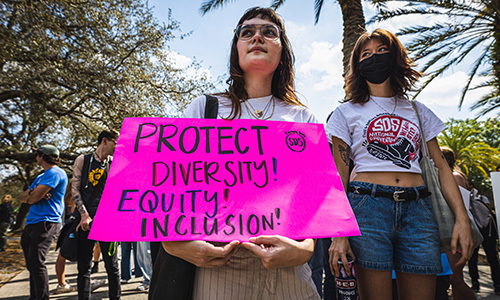Pledge
Freedom to Learn
AAC&U joined the AFT, the NEA, the AAUP, and the Network for Public Education in this pledge to fight back against political assaults on public education, academic freedom, and vulnerable students.

Trending Topic
Increasingly, government intervention in higher education is constraining the freedom of inquiry and expression essential to liberal education and violating the principles of academic freedom and institutional autonomy.
Across the country, state legislatures and governors are imposing or seeking to impose restrictions on teaching and learning in colleges and universities. The majority of these restrictions are focused on concepts related to race, gender, LGBTQ+ identities, and American history. Meanwhile, the US Supreme Court is overturning precedents with widespread implications for higher education.
These government interventions violate the principles of academic freedom and institutional autonomy on which the quality and integrity of our system of higher education depends. Foundational to American higher education, these closely interrelated principles both enable and preserve the freedom of inquiry and expression necessary to pursue truth wherever it may lead, to increase knowledge, and to drive innovation and discovery.
Pledge
AAC&U joined the AFT, the NEA, the AAUP, and the Network for Public Education in this pledge to fight back against political assaults on public education, academic freedom, and vulnerable students.
Open Letter
AAC&U joins 61 organizations and presidents in calling for coalitions focused on preserving the foundational qualities of higher ed and its link to the American promises of democracy and freedom for all.
Public Statement
The decision by the US Supreme Court to prohibit the use of race as a factor in college admissions constitutes a major setback for higher education and for our democracy.
Public Statement
Signed by more than 100 former presidents, this statement is the first product of a new leadership group formed by AAC&U and the Charles F. Kettering Foundation to support higher education and its role in American democracy.
Public Statement
This joint statement explains that legislative restrictions on freedom of inquiry and expression violate the institutional autonomy on which the quality and integrity of our system of higher education depends.
Open Letter
Signed by AAC&U and more than 90 other organizations, this higher education community letter stresses the importance of free and open academic inquiry on our campuses.
Public Statement
More than 145 organizations signed on to this statement by AAC&U, PEN America, American Association of University Professors, and the American Historical Association.
Updated weekly by PEN America, the index tracks legislation that would restrict the freedom to learn and teach.
The Chronicle of Higher Education is tracking legislation that would prohibit DEI offices or staff; ban mandatory diversity training; prohibit the use of diversity statements in hiring and promotion; or prohibit use of race, sex, color, ethnicity, or national origin in admissions or employment.
Developed by the American Council on Education and PEN America, this resource guide helps higher ed leaders make the case against politically imposed restrictions on what is taught and how.
Published in Empowering Administrators (Routledge, 2024), this chapter by AAC&U President Lynn Pasquerella examines the dilemma of college administrators leading public institutions in states that have imposed educational gag orders within the context of a public administrator's duty to further the public interest and maintain the public trust.
The 2023 survey found strong support for the accurate portrayal of racism in schools. Americans across the political spectrum, including 3 in 4 Republicans, say educating children on the history of racism and promoting diversity in the workplace are important for racial healing.
Professor Paul Butler from Georgetown Law and Frederick M. Lawrence, Secretary and CEO of the Phi Beta Kappa Society and Distinguished Lecturer in Law at Georgetown, reflect on the potential impact of ending affirmative action in college admissions and offer advice for campus leaders.

Magazine Article
The attacks on DEI programs are a threat to the democratic purposes of higher education, AAC&U President Lynn Pasquerella write in Academe magazine.

Magazine Article
The negative impact of eliminating race-conscious admissions extends to the entire student body, AAC&U President Lynn Pasquerella writes in LearningWell magazine.

Radio Interview
On this episode of NPR’s “Buffalo, What’s Next?” AAC&U President Lynn Pasquerella discusses the recent Supreme Court decisions on race-conscious admissions and student loan debt forgiveness.

Web-Exclusive Article
American higher education is facing an existential threat, write AAC&U President Lynn Pasquerella and Frederick M. Lawrence, secretary and chief executive officer of the Phi Beta Kappa Society.

Podcast Episode
AAC&U President Lynn Pasquerella discusses recent and proposed changes to higher education in Florida as well as the state’s rejection of an AP course in African American studies.

Op-ed
Florida’s decision to reject a new Advanced Placement class on African American studies raises unsettling questions, Lynn Pasquerella and Mary Dana Hinton write in Inside Higher Ed.

Magazine Article
Bans on teaching critical race theory, surveys assessing viewpoint diversity of professors, pressure to change course content and syllabi, and threats to eliminate tenure undermine higher education’s purpose.